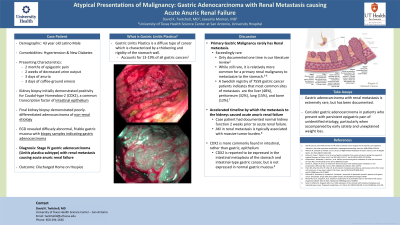Sunday Poster Session
Category: Stomach
P1399 - Atypical Presentations of Malignancy: Gastric Adenocarcinoma With Renal Metastasis Causing Acute Anuric Renal Failure
Sunday, October 22, 2023
3:30 PM - 7:00 PM PT
Location: Exhibit Hall

Has Audio

David Twitchell, MD
UT Health San Antonio
San Antonio, TX
Presenting Author(s)
David Twitchell, MD1, Jawairia Memon, MD2
1UT Health San Antonio, San Antonio, TX; 2University of Texas Health Science Center San Antonio, San Antonio, TX
Introduction: This is the report of a relatively young male patient with minimal medical co-morbidities who developed de novo linitis plastica gastric adenocarcinoma with renal metastasis resulting in acute anuric renal failure requiring hemodialysis.
Case Description/Methods: A 43 year-old Latino male with Hypertension and uncontrolled Type 2 Diabetes Mellitus new to long-term insulin who had no personal or family history of cancer presented to our institution with 2 weeks of worsening urine output and 3 days of anuria, 4 days of fever/chills, and 3 days of coffee-ground emesis. On admission, patient had a creatinine level of 10.50 (baseline 1.10) and notably had normal renal function 2 weeks prior. A kidney biopsy was performed to determine the etiology of acute renal decline and initially demonstrated positivity for Caudal-type Homeobox-2 (CDX2), a common transcription factor of intestinal epithelium. The kidney biopsy demonstrated poorly-differentiated adenocarcinoma of non-renal etiology. An esophagogastroduodenoscopy (EGD) was performed to identify the source of hematemesis and revealed diffusely abnormal, friable gastric mucosa with biopsy samples indicating gastric adenocarcinoma. Given the extent of abnormal gastric mucosa, it is likely that this Stage IV gastric adenocarcinoma represents a linitis plastica subtype with renal metastasis. Given the uncurable nature of his malignancy diagnosis, the patient discharged home with hospice and symptomatic management.1
Discussion: The most unique aspect of this case is the exceedingly rare nature for a primary gastric malignancy to metastasize to the kidneys; an observation which notably was only documented one time in our literature review.2 While still rare, it is relatively more common for a primary renal malignancy to metastasize to the stomach. 3-6 Another unique feature of this case is the accelerated timeline by which the metastasis to the kidneys caused acute anuric renal failure. It is uncommon for a renal malignancy to cause anuria and acute renal failure, although it has been rarely documented as a consequence of acute kidney fibrosis in the setting of both metastatic melanoma and breast cancers.7,8 Another notable feature highlighted by this case is that CDX2 is more commonly found in intestinal, rather than gastric, epithelium. However, it has been reported that CDX2 is expressed in the intestinal metaplasia of the stomach and intestinal-type gastric cancer, but is not expressed in normal gastric mucosa.9

Disclosures:
David Twitchell, MD1, Jawairia Memon, MD2. P1399 - Atypical Presentations of Malignancy: Gastric Adenocarcinoma With Renal Metastasis Causing Acute Anuric Renal Failure, ACG 2023 Annual Scientific Meeting Abstracts. Vancouver, BC, Canada: American College of Gastroenterology.
1UT Health San Antonio, San Antonio, TX; 2University of Texas Health Science Center San Antonio, San Antonio, TX
Introduction: This is the report of a relatively young male patient with minimal medical co-morbidities who developed de novo linitis plastica gastric adenocarcinoma with renal metastasis resulting in acute anuric renal failure requiring hemodialysis.
Case Description/Methods: A 43 year-old Latino male with Hypertension and uncontrolled Type 2 Diabetes Mellitus new to long-term insulin who had no personal or family history of cancer presented to our institution with 2 weeks of worsening urine output and 3 days of anuria, 4 days of fever/chills, and 3 days of coffee-ground emesis. On admission, patient had a creatinine level of 10.50 (baseline 1.10) and notably had normal renal function 2 weeks prior. A kidney biopsy was performed to determine the etiology of acute renal decline and initially demonstrated positivity for Caudal-type Homeobox-2 (CDX2), a common transcription factor of intestinal epithelium. The kidney biopsy demonstrated poorly-differentiated adenocarcinoma of non-renal etiology. An esophagogastroduodenoscopy (EGD) was performed to identify the source of hematemesis and revealed diffusely abnormal, friable gastric mucosa with biopsy samples indicating gastric adenocarcinoma. Given the extent of abnormal gastric mucosa, it is likely that this Stage IV gastric adenocarcinoma represents a linitis plastica subtype with renal metastasis. Given the uncurable nature of his malignancy diagnosis, the patient discharged home with hospice and symptomatic management.1
Discussion: The most unique aspect of this case is the exceedingly rare nature for a primary gastric malignancy to metastasize to the kidneys; an observation which notably was only documented one time in our literature review.2 While still rare, it is relatively more common for a primary renal malignancy to metastasize to the stomach. 3-6 Another unique feature of this case is the accelerated timeline by which the metastasis to the kidneys caused acute anuric renal failure. It is uncommon for a renal malignancy to cause anuria and acute renal failure, although it has been rarely documented as a consequence of acute kidney fibrosis in the setting of both metastatic melanoma and breast cancers.7,8 Another notable feature highlighted by this case is that CDX2 is more commonly found in intestinal, rather than gastric, epithelium. However, it has been reported that CDX2 is expressed in the intestinal metaplasia of the stomach and intestinal-type gastric cancer, but is not expressed in normal gastric mucosa.9

Figure: Figure 1: Abnormal Gastric Body Mucosa of Case Patient during Esophagogastroduodenoscopy (EGD) Visualization
Disclosures:
David Twitchell indicated no relevant financial relationships.
Jawairia Memon indicated no relevant financial relationships.
David Twitchell, MD1, Jawairia Memon, MD2. P1399 - Atypical Presentations of Malignancy: Gastric Adenocarcinoma With Renal Metastasis Causing Acute Anuric Renal Failure, ACG 2023 Annual Scientific Meeting Abstracts. Vancouver, BC, Canada: American College of Gastroenterology.
